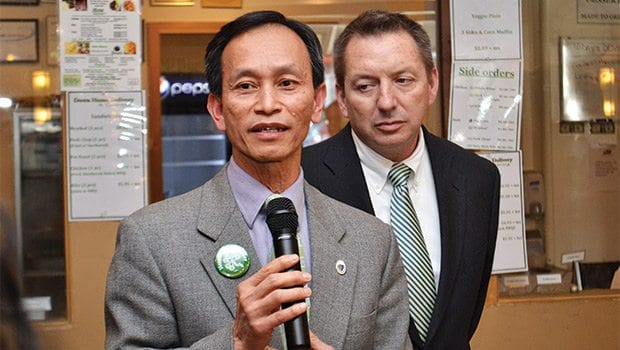Boosting Mass. businesses
Business Development sec. seeks to broaden opportunity

While the Greater Boston area has long been a hotbed of business innovation — from the biotech boom in Kendall Square to the tech start-ups growing on the Boston waterfront — it’s Nam Pham’s job to make sure the job creation is shared throughout the state.
As the state’s assistant secretary of Business Development, Pham’s job is to persuade businesses to grow and retain jobs across the commonwealth, including in the struggling gateway cities. His efforts involve brokering deals with some of the largest firms in the United States, including online retail giant Amazon, whose $54 million Fall River fulfillment center is expected to create 500 new full-time and as many as 2,000 seasonal jobs.
But more importantly, Pham’s efforts are focused on the engine of the Massachusetts economy: small businesses.
“Eighty percent of the Massachusetts economy comprises small businesses with less than 50 employees,” Pham told the Banner. “They’re the number one driver of jobs and opportunities in Massachusetts.”
Governor Charlie Baker’s administration rolls out new initiatives to help with small business development. It’s Pham’s job to make sure those initiatives are getting out to the businesses that need them the most. He also must make sure businesses are able to take advantage of the state’s opportunities.
“In inner cities, in urban areas, a lot of these businesses are owned and operated by immigrants,” he says. “We have to pay attention to immigrant-owned businesses. They don’t always understand the bureaucracy you have to navigate to own a business. Part of the job of the Business Development Office is to work with those people.”
Private sector/public sector
Born in the north of Vietnam, Pham came to the United States at the age of 19. He graduated from the University of Minnesota Carlson School of Management and obtained a master’s degree from Harvard’s John F. Kennedy School of Government. He has worked for Bank of America, Citizens Bank, The Massachusetts Office for Refugees and Immigrants and the Massachusetts International Trade office.
In his most recent job, as executive director of the VietAid community development corporation, Pham worked closely with the local small businesses — many of them immigrant owned — that helped revitalize Dorchester Avenue over the last 30 years. Now, as a state official, he is helping the state to be more responsive to their needs.
Pham’s office offers small businesses assistance in the form of loans, technical assistance and incentives to remain and grow in the state. Those incentives most often come in the form of tax breaks and credits businesses receive in exchange for the promise to create new jobs.
One recent example: Woonsocket Glass Fabricators, which the Baker administration lured from across the state’s border with Rhode Island, recently opened a new plant in Whitinsville.
“They were so happy with the quality of worker they had here, in seven months they doubled their workforce from 25 to 50 employees,” Pham says.
Pham attributes the quality of the state’s workforce to its nation-leading education system and high percentage of immigrants.
“I think, number one, we are well trained,” he said. “We have more colleges and universities per capita than any other state. And number two is the work ethic. The people here, according to the CEO of Woonsocket Glass, were much better than his old workforce. Also, I think in Massachusetts, especially in the Boston area, we have a large population of immigrants. One out of four people in Boston is foreign-born. When you are an immigrant, you tend to be more driven to make something of yourself, to try to prove that you are worthwhile to be here.”
Beyond 128
The administration has helped forge other major deals in Boston and its surrounding cities and towns, with the relocation of G.E.’s corporate headquarters to Boston generating the most headlines. But the Woonsocket deal and others highlight Pham’s push to create and expand jobs outside of Route 128. With 70 percent of all business revenues in Massachusetts generated within the highway’s ten-mile radius around Boston, the Baker administration is helping facilitate growth in areas like the South Coast and Western Massachusetts, as well as in the state’s gateway cities.
Lowell scored a coup recently when state officials persuaded Kronos, a firm that specializes in human resources technology, to relocate there from neighboring Chelmsford. The firm had outgrown its headquarters and, according to Pham, was considering leaving the state.
“They received offers from other states,” he said. “It would have been a big loss — 1,300 jobs that pay an average of $108,000 per job per year. And we were able to convince them to stay in Massachusetts and move to Lowell. They will also spend $35 million to fix up a building and create a minimum additional 400 jobs in the next five years, and as many as 1,000. They are hiring 400 right now.”
For the many small businesses already operating in Boston, Pham points to key initiatives aimed at helping them grow. One is a renewed effort to make bidding on state contracts faster and easier.
“The state on average purchases $4 billion a year in goods and services,” Pham said. “We know small businesses have to struggle to fill out all of the paperwork. So we have been able to reduce the paperwork for small businesses to be certified by two-thirds. Now there are more small businesses, more minority- and woman-owned businesses eligible to do business with the state.”
Another initiative the Baker administration is advancing: streamlining the more than 2,600 regulations with which Massachusetts businesses must comply.
“We hope that within several months, many of those outdated rules and regulations will be eliminated,” Pham said.
For businesses struggling to navigate permitting and regulations, Pham’s office has small business ombudsmen, who work with state and local government to help guide businesses through the permitting process.
Pham’s job has taken him across the state. The initiatives he oversees, including small business loans and a raft of other business assistance programs, have kept him busy in his two years in office.
“It’s been a whirlwind,” he said.







